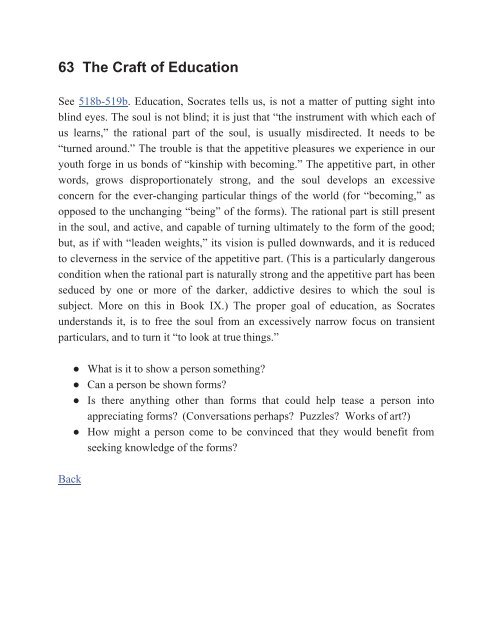The Intelligent Troglodyte’s Guide to Plato’s Republic, 2016a
The Intelligent Troglodyte’s Guide to Plato’s Republic, 2016a
The Intelligent Troglodyte’s Guide to Plato’s Republic, 2016a
You also want an ePaper? Increase the reach of your titles
YUMPU automatically turns print PDFs into web optimized ePapers that Google loves.
63 <strong>The</strong> Craft of Education<br />
See 518b-519b. Education, Socrates tells us, is not a matter of putting sight in<strong>to</strong><br />
blind eyes. <strong>The</strong> soul is not blind; it is just that “the instrument with which each of<br />
us learns,” the rational part of the soul, is usually misdirected. It needs <strong>to</strong> be<br />
“turned around.” <strong>The</strong> trouble is that the appetitive pleasures we experience in our<br />
youth forge in us bonds of “kinship with becoming.” <strong>The</strong> appetitive part, in other<br />
words, grows disproportionately strong, and the soul develops an excessive<br />
concern for the ever-changing particular things of the world (for “becoming,” as<br />
opposed <strong>to</strong> the unchanging “being” of the forms). <strong>The</strong> rational part is still present<br />
in the soul, and active, and capable of turning ultimately <strong>to</strong> the form of the good;<br />
but, as if with “leaden weights,” its vision is pulled downwards, and it is reduced<br />
<strong>to</strong> cleverness in the service of the appetitive part. (This is a particularly dangerous<br />
condition when the rational part is naturally strong and the appetitive part has been<br />
seduced by one or more of the darker, addictive desires <strong>to</strong> which the soul is<br />
subject. More on this in Book IX.) <strong>The</strong> proper goal of education, as Socrates<br />
understands it, is <strong>to</strong> free the soul from an excessively narrow focus on transient<br />
particulars, and <strong>to</strong> turn it “<strong>to</strong> look at true things.”<br />
What is it <strong>to</strong> show a person something?<br />
Can a person be shown forms?<br />
Is there anything other than forms that could help tease a person in<strong>to</strong><br />
appreciating forms? (Conversations perhaps? Puzzles? Works of art?)<br />
How might a person come <strong>to</strong> be convinced that they would benefit from<br />
seeking knowledge of the forms?<br />
Back


















